Understanding Entrepreneurship and Small Business Management Report
VerifiedAdded on 2019/12/18
|17
|5817
|167
Report
AI Summary
This comprehensive report, created for the Federation of Small Businesses (FSB), delves into the multifaceted world of entrepreneurship and small business management. It begins by defining various types of entrepreneurship, including innovative, adaptive, and drone entrepreneurs, and analyzes their structures, comparing and contrasting their approaches. The report assesses the impact of these different entrepreneurial types on society and the current business economy, highlighting the roles of private, public, and social enterprises. Further, it examines the characteristics of successful entrepreneurs, exploring how their personality traits reflect their motivation and business mindset. The report also investigates the influence of background and past experiences on fostering entrepreneurship. The report concludes by emphasizing the critical role small and medium-sized enterprises play in the economy and providing insights into the entrepreneurial landscape. This report is available on Desklib, a platform offering AI-based study tools.

ENTREPRENEURSHIP AND SMALL BUSINESS
MANAGEMENT
Page 1 of 17
MANAGEMENT
Page 1 of 17
Paraphrase This Document
Need a fresh take? Get an instant paraphrase of this document with our AI Paraphraser
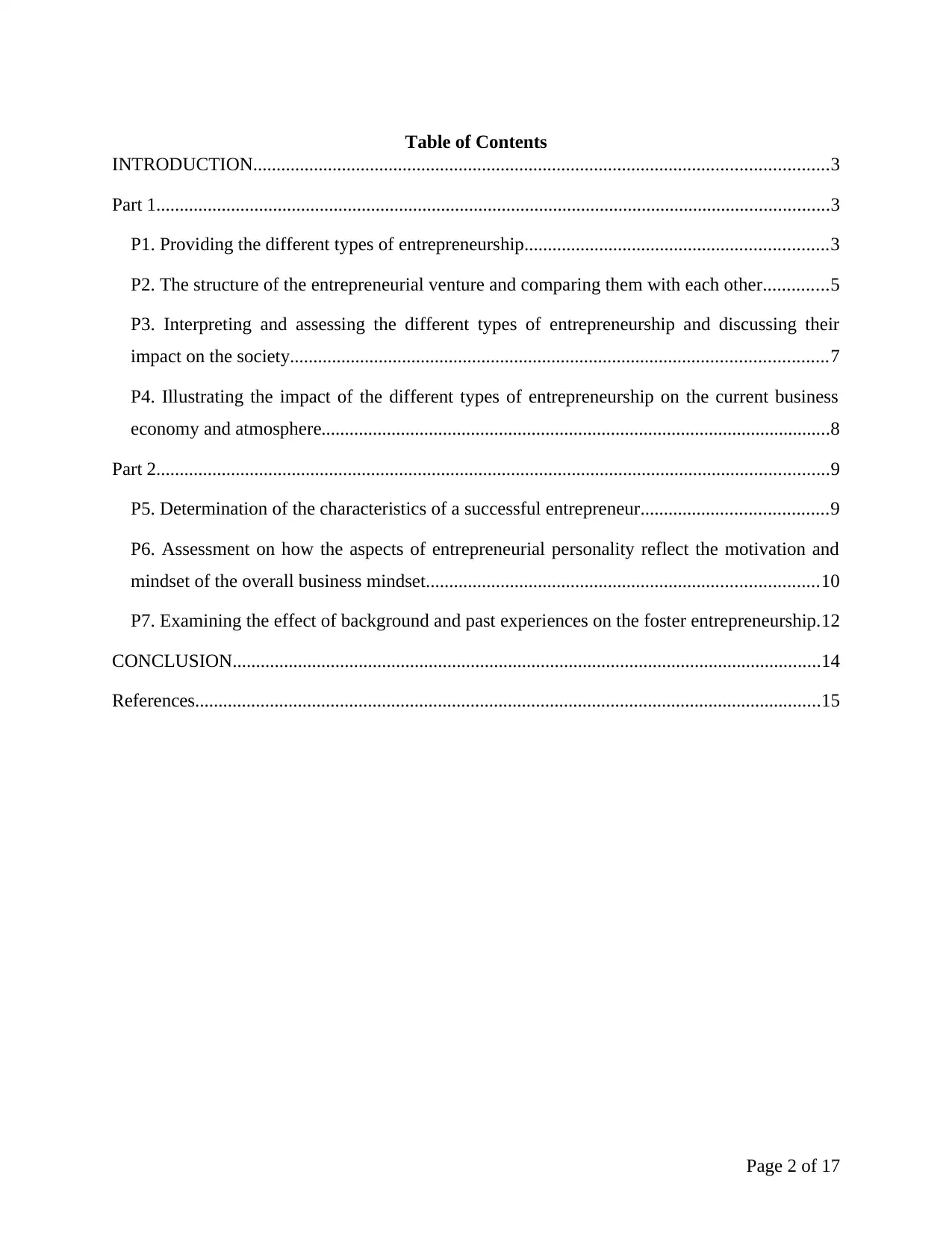
Table of Contents
INTRODUCTION...........................................................................................................................3
Part 1................................................................................................................................................3
P1. Providing the different types of entrepreneurship.................................................................3
P2. The structure of the entrepreneurial venture and comparing them with each other..............5
P3. Interpreting and assessing the different types of entrepreneurship and discussing their
impact on the society...................................................................................................................7
P4. Illustrating the impact of the different types of entrepreneurship on the current business
economy and atmosphere.............................................................................................................8
Part 2................................................................................................................................................9
P5. Determination of the characteristics of a successful entrepreneur........................................9
P6. Assessment on how the aspects of entrepreneurial personality reflect the motivation and
mindset of the overall business mindset....................................................................................10
P7. Examining the effect of background and past experiences on the foster entrepreneurship.12
CONCLUSION..............................................................................................................................14
References......................................................................................................................................15
Page 2 of 17
INTRODUCTION...........................................................................................................................3
Part 1................................................................................................................................................3
P1. Providing the different types of entrepreneurship.................................................................3
P2. The structure of the entrepreneurial venture and comparing them with each other..............5
P3. Interpreting and assessing the different types of entrepreneurship and discussing their
impact on the society...................................................................................................................7
P4. Illustrating the impact of the different types of entrepreneurship on the current business
economy and atmosphere.............................................................................................................8
Part 2................................................................................................................................................9
P5. Determination of the characteristics of a successful entrepreneur........................................9
P6. Assessment on how the aspects of entrepreneurial personality reflect the motivation and
mindset of the overall business mindset....................................................................................10
P7. Examining the effect of background and past experiences on the foster entrepreneurship.12
CONCLUSION..............................................................................................................................14
References......................................................................................................................................15
Page 2 of 17
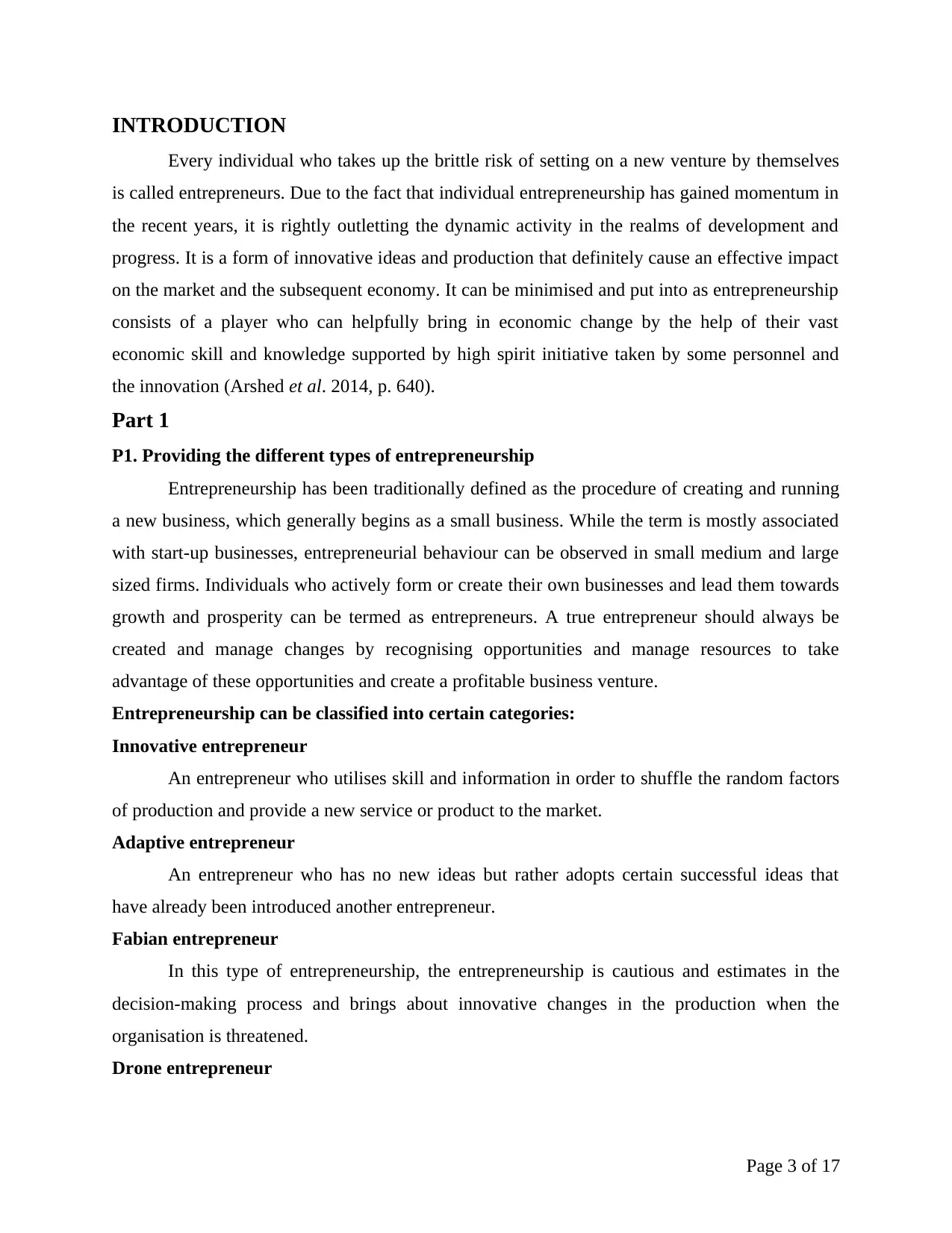
INTRODUCTION
Every individual who takes up the brittle risk of setting on a new venture by themselves
is called entrepreneurs. Due to the fact that individual entrepreneurship has gained momentum in
the recent years, it is rightly outletting the dynamic activity in the realms of development and
progress. It is a form of innovative ideas and production that definitely cause an effective impact
on the market and the subsequent economy. It can be minimised and put into as entrepreneurship
consists of a player who can helpfully bring in economic change by the help of their vast
economic skill and knowledge supported by high spirit initiative taken by some personnel and
the innovation (Arshed et al. 2014, p. 640).
Part 1
P1. Providing the different types of entrepreneurship
Entrepreneurship has been traditionally defined as the procedure of creating and running
a new business, which generally begins as a small business. While the term is mostly associated
with start-up businesses, entrepreneurial behaviour can be observed in small medium and large
sized firms. Individuals who actively form or create their own businesses and lead them towards
growth and prosperity can be termed as entrepreneurs. A true entrepreneur should always be
created and manage changes by recognising opportunities and manage resources to take
advantage of these opportunities and create a profitable business venture.
Entrepreneurship can be classified into certain categories:
Innovative entrepreneur
An entrepreneur who utilises skill and information in order to shuffle the random factors
of production and provide a new service or product to the market.
Adaptive entrepreneur
An entrepreneur who has no new ideas but rather adopts certain successful ideas that
have already been introduced another entrepreneur.
Fabian entrepreneur
In this type of entrepreneurship, the entrepreneurship is cautious and estimates in the
decision-making process and brings about innovative changes in the production when the
organisation is threatened.
Drone entrepreneur
Page 3 of 17
Every individual who takes up the brittle risk of setting on a new venture by themselves
is called entrepreneurs. Due to the fact that individual entrepreneurship has gained momentum in
the recent years, it is rightly outletting the dynamic activity in the realms of development and
progress. It is a form of innovative ideas and production that definitely cause an effective impact
on the market and the subsequent economy. It can be minimised and put into as entrepreneurship
consists of a player who can helpfully bring in economic change by the help of their vast
economic skill and knowledge supported by high spirit initiative taken by some personnel and
the innovation (Arshed et al. 2014, p. 640).
Part 1
P1. Providing the different types of entrepreneurship
Entrepreneurship has been traditionally defined as the procedure of creating and running
a new business, which generally begins as a small business. While the term is mostly associated
with start-up businesses, entrepreneurial behaviour can be observed in small medium and large
sized firms. Individuals who actively form or create their own businesses and lead them towards
growth and prosperity can be termed as entrepreneurs. A true entrepreneur should always be
created and manage changes by recognising opportunities and manage resources to take
advantage of these opportunities and create a profitable business venture.
Entrepreneurship can be classified into certain categories:
Innovative entrepreneur
An entrepreneur who utilises skill and information in order to shuffle the random factors
of production and provide a new service or product to the market.
Adaptive entrepreneur
An entrepreneur who has no new ideas but rather adopts certain successful ideas that
have already been introduced another entrepreneur.
Fabian entrepreneur
In this type of entrepreneurship, the entrepreneurship is cautious and estimates in the
decision-making process and brings about innovative changes in the production when the
organisation is threatened.
Drone entrepreneur
Page 3 of 17
⊘ This is a preview!⊘
Do you want full access?
Subscribe today to unlock all pages.

Trusted by 1+ million students worldwide
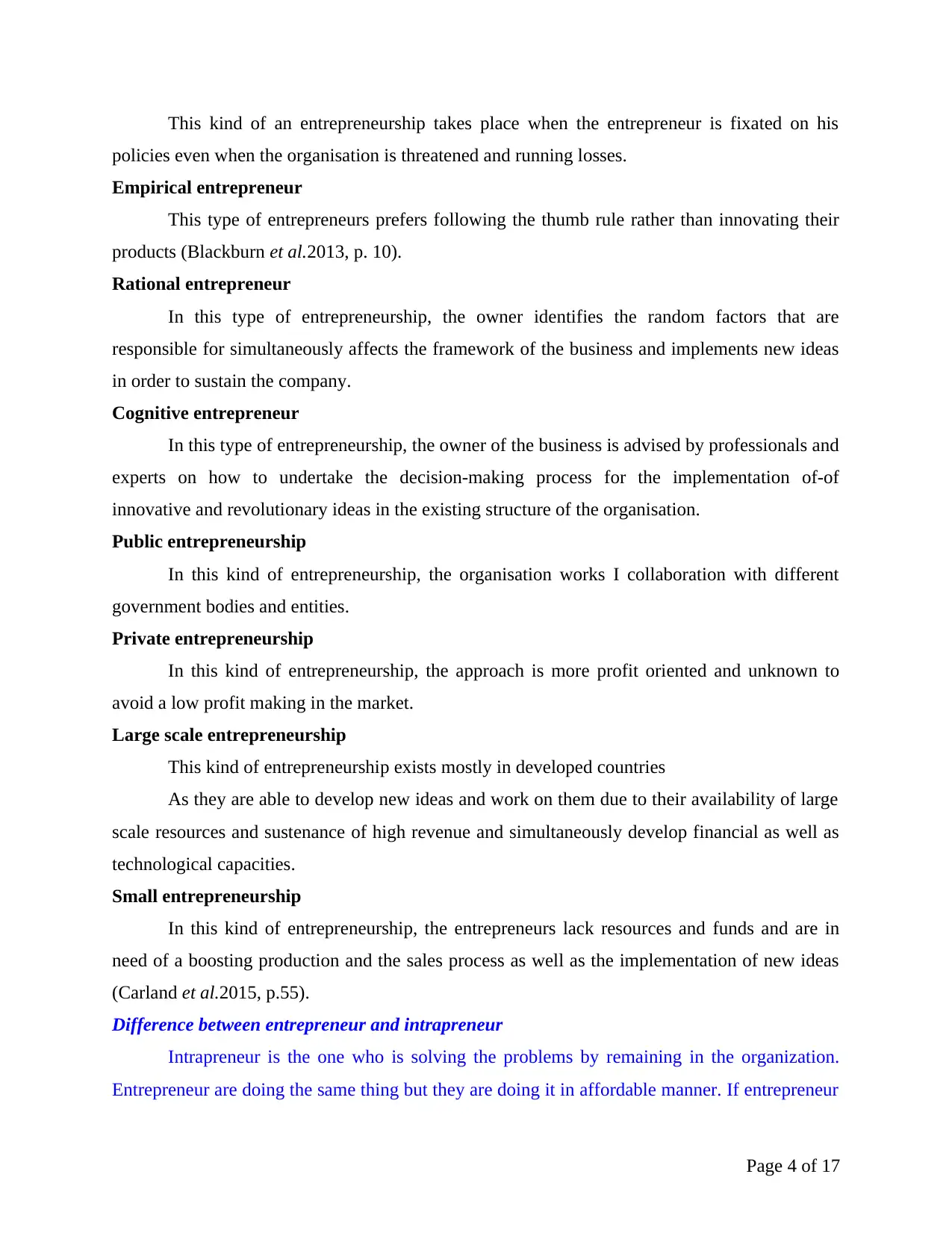
This kind of an entrepreneurship takes place when the entrepreneur is fixated on his
policies even when the organisation is threatened and running losses.
Empirical entrepreneur
This type of entrepreneurs prefers following the thumb rule rather than innovating their
products (Blackburn et al.2013, p. 10).
Rational entrepreneur
In this type of entrepreneurship, the owner identifies the random factors that are
responsible for simultaneously affects the framework of the business and implements new ideas
in order to sustain the company.
Cognitive entrepreneur
In this type of entrepreneurship, the owner of the business is advised by professionals and
experts on how to undertake the decision-making process for the implementation of-of
innovative and revolutionary ideas in the existing structure of the organisation.
Public entrepreneurship
In this kind of entrepreneurship, the organisation works I collaboration with different
government bodies and entities.
Private entrepreneurship
In this kind of entrepreneurship, the approach is more profit oriented and unknown to
avoid a low profit making in the market.
Large scale entrepreneurship
This kind of entrepreneurship exists mostly in developed countries
As they are able to develop new ideas and work on them due to their availability of large
scale resources and sustenance of high revenue and simultaneously develop financial as well as
technological capacities.
Small entrepreneurship
In this kind of entrepreneurship, the entrepreneurs lack resources and funds and are in
need of a boosting production and the sales process as well as the implementation of new ideas
(Carland et al.2015, p.55).
Difference between entrepreneur and intrapreneur
Intrapreneur is the one who is solving the problems by remaining in the organization.
Entrepreneur are doing the same thing but they are doing it in affordable manner. If entrepreneur
Page 4 of 17
policies even when the organisation is threatened and running losses.
Empirical entrepreneur
This type of entrepreneurs prefers following the thumb rule rather than innovating their
products (Blackburn et al.2013, p. 10).
Rational entrepreneur
In this type of entrepreneurship, the owner identifies the random factors that are
responsible for simultaneously affects the framework of the business and implements new ideas
in order to sustain the company.
Cognitive entrepreneur
In this type of entrepreneurship, the owner of the business is advised by professionals and
experts on how to undertake the decision-making process for the implementation of-of
innovative and revolutionary ideas in the existing structure of the organisation.
Public entrepreneurship
In this kind of entrepreneurship, the organisation works I collaboration with different
government bodies and entities.
Private entrepreneurship
In this kind of entrepreneurship, the approach is more profit oriented and unknown to
avoid a low profit making in the market.
Large scale entrepreneurship
This kind of entrepreneurship exists mostly in developed countries
As they are able to develop new ideas and work on them due to their availability of large
scale resources and sustenance of high revenue and simultaneously develop financial as well as
technological capacities.
Small entrepreneurship
In this kind of entrepreneurship, the entrepreneurs lack resources and funds and are in
need of a boosting production and the sales process as well as the implementation of new ideas
(Carland et al.2015, p.55).
Difference between entrepreneur and intrapreneur
Intrapreneur is the one who is solving the problems by remaining in the organization.
Entrepreneur are doing the same thing but they are doing it in affordable manner. If entrepreneur
Page 4 of 17
Paraphrase This Document
Need a fresh take? Get an instant paraphrase of this document with our AI Paraphraser
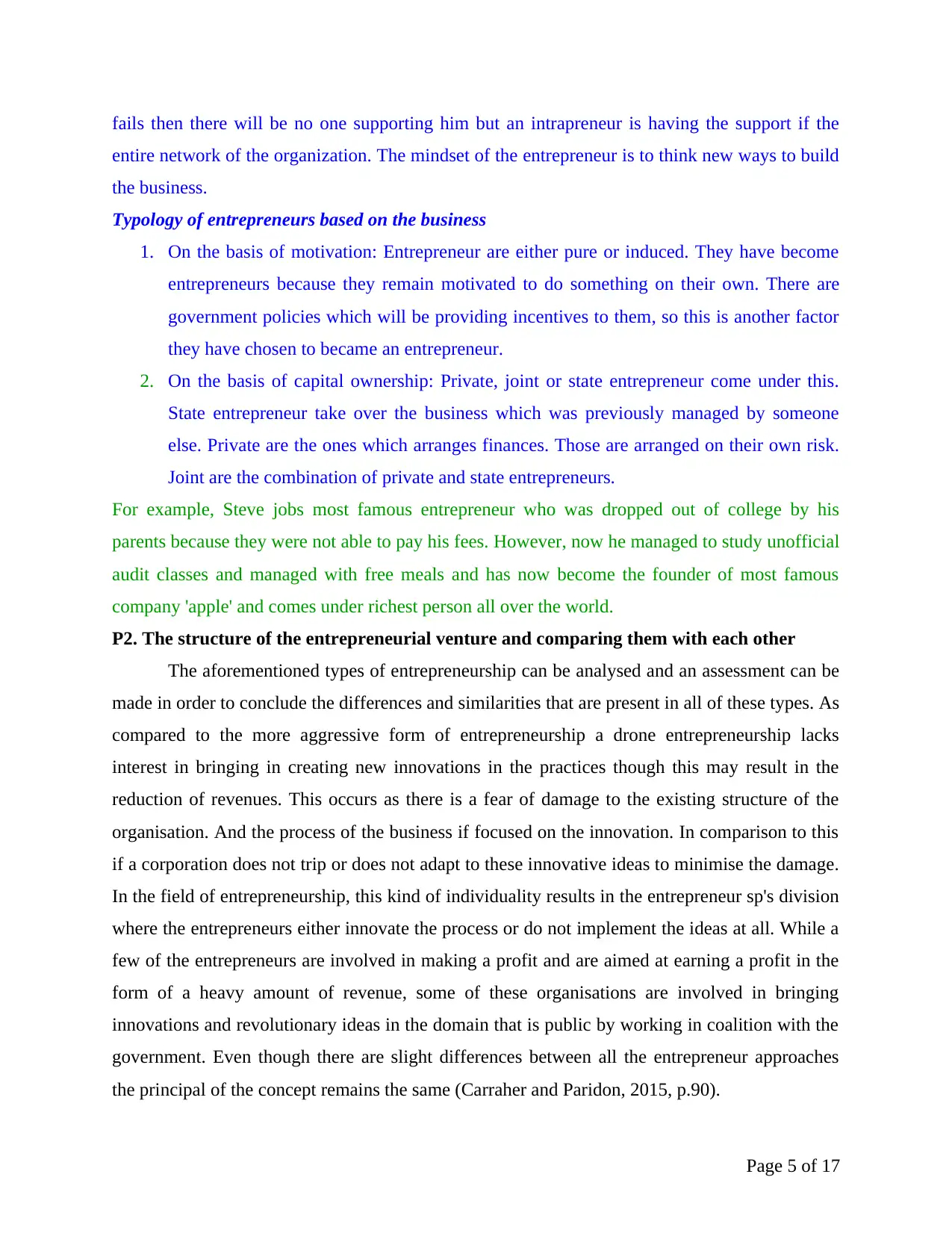
fails then there will be no one supporting him but an intrapreneur is having the support if the
entire network of the organization. The mindset of the entrepreneur is to think new ways to build
the business.
Typology of entrepreneurs based on the business
1. On the basis of motivation: Entrepreneur are either pure or induced. They have become
entrepreneurs because they remain motivated to do something on their own. There are
government policies which will be providing incentives to them, so this is another factor
they have chosen to became an entrepreneur.
2. On the basis of capital ownership: Private, joint or state entrepreneur come under this.
State entrepreneur take over the business which was previously managed by someone
else. Private are the ones which arranges finances. Those are arranged on their own risk.
Joint are the combination of private and state entrepreneurs.
For example, Steve jobs most famous entrepreneur who was dropped out of college by his
parents because they were not able to pay his fees. However, now he managed to study unofficial
audit classes and managed with free meals and has now become the founder of most famous
company 'apple' and comes under richest person all over the world.
P2. The structure of the entrepreneurial venture and comparing them with each other
The aforementioned types of entrepreneurship can be analysed and an assessment can be
made in order to conclude the differences and similarities that are present in all of these types. As
compared to the more aggressive form of entrepreneurship a drone entrepreneurship lacks
interest in bringing in creating new innovations in the practices though this may result in the
reduction of revenues. This occurs as there is a fear of damage to the existing structure of the
organisation. And the process of the business if focused on the innovation. In comparison to this
if a corporation does not trip or does not adapt to these innovative ideas to minimise the damage.
In the field of entrepreneurship, this kind of individuality results in the entrepreneur sp's division
where the entrepreneurs either innovate the process or do not implement the ideas at all. While a
few of the entrepreneurs are involved in making a profit and are aimed at earning a profit in the
form of a heavy amount of revenue, some of these organisations are involved in bringing
innovations and revolutionary ideas in the domain that is public by working in coalition with the
government. Even though there are slight differences between all the entrepreneur approaches
the principal of the concept remains the same (Carraher and Paridon, 2015, p.90).
Page 5 of 17
entire network of the organization. The mindset of the entrepreneur is to think new ways to build
the business.
Typology of entrepreneurs based on the business
1. On the basis of motivation: Entrepreneur are either pure or induced. They have become
entrepreneurs because they remain motivated to do something on their own. There are
government policies which will be providing incentives to them, so this is another factor
they have chosen to became an entrepreneur.
2. On the basis of capital ownership: Private, joint or state entrepreneur come under this.
State entrepreneur take over the business which was previously managed by someone
else. Private are the ones which arranges finances. Those are arranged on their own risk.
Joint are the combination of private and state entrepreneurs.
For example, Steve jobs most famous entrepreneur who was dropped out of college by his
parents because they were not able to pay his fees. However, now he managed to study unofficial
audit classes and managed with free meals and has now become the founder of most famous
company 'apple' and comes under richest person all over the world.
P2. The structure of the entrepreneurial venture and comparing them with each other
The aforementioned types of entrepreneurship can be analysed and an assessment can be
made in order to conclude the differences and similarities that are present in all of these types. As
compared to the more aggressive form of entrepreneurship a drone entrepreneurship lacks
interest in bringing in creating new innovations in the practices though this may result in the
reduction of revenues. This occurs as there is a fear of damage to the existing structure of the
organisation. And the process of the business if focused on the innovation. In comparison to this
if a corporation does not trip or does not adapt to these innovative ideas to minimise the damage.
In the field of entrepreneurship, this kind of individuality results in the entrepreneur sp's division
where the entrepreneurs either innovate the process or do not implement the ideas at all. While a
few of the entrepreneurs are involved in making a profit and are aimed at earning a profit in the
form of a heavy amount of revenue, some of these organisations are involved in bringing
innovations and revolutionary ideas in the domain that is public by working in coalition with the
government. Even though there are slight differences between all the entrepreneur approaches
the principal of the concept remains the same (Carraher and Paridon, 2015, p.90).
Page 5 of 17
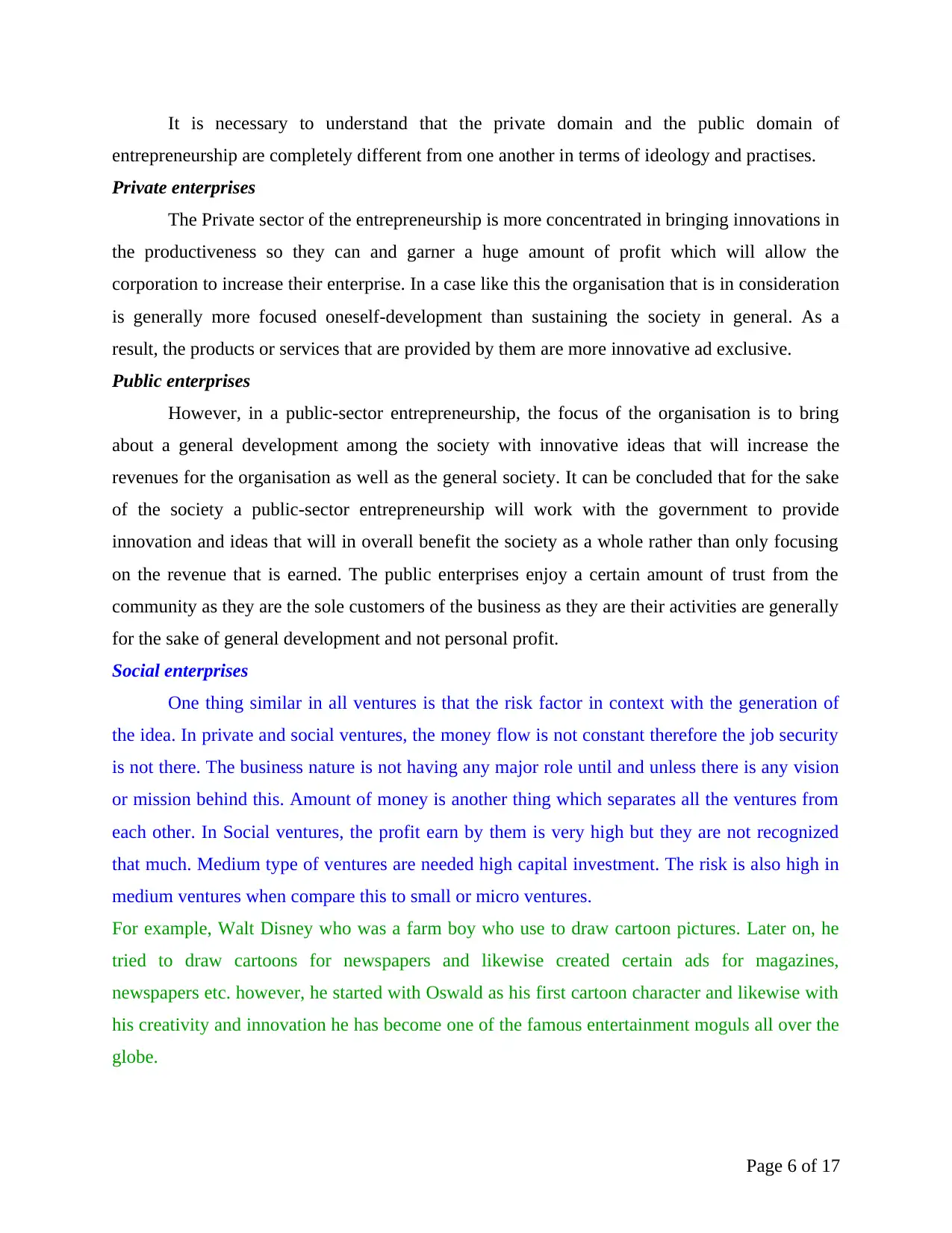
It is necessary to understand that the private domain and the public domain of
entrepreneurship are completely different from one another in terms of ideology and practises.
Private enterprises
The Private sector of the entrepreneurship is more concentrated in bringing innovations in
the productiveness so they can and garner a huge amount of profit which will allow the
corporation to increase their enterprise. In a case like this the organisation that is in consideration
is generally more focused oneself-development than sustaining the society in general. As a
result, the products or services that are provided by them are more innovative ad exclusive.
Public enterprises
However, in a public-sector entrepreneurship, the focus of the organisation is to bring
about a general development among the society with innovative ideas that will increase the
revenues for the organisation as well as the general society. It can be concluded that for the sake
of the society a public-sector entrepreneurship will work with the government to provide
innovation and ideas that will in overall benefit the society as a whole rather than only focusing
on the revenue that is earned. The public enterprises enjoy a certain amount of trust from the
community as they are the sole customers of the business as they are their activities are generally
for the sake of general development and not personal profit.
Social enterprises
One thing similar in all ventures is that the risk factor in context with the generation of
the idea. In private and social ventures, the money flow is not constant therefore the job security
is not there. The business nature is not having any major role until and unless there is any vision
or mission behind this. Amount of money is another thing which separates all the ventures from
each other. In Social ventures, the profit earn by them is very high but they are not recognized
that much. Medium type of ventures are needed high capital investment. The risk is also high in
medium ventures when compare this to small or micro ventures.
For example, Walt Disney who was a farm boy who use to draw cartoon pictures. Later on, he
tried to draw cartoons for newspapers and likewise created certain ads for magazines,
newspapers etc. however, he started with Oswald as his first cartoon character and likewise with
his creativity and innovation he has become one of the famous entertainment moguls all over the
globe.
Page 6 of 17
entrepreneurship are completely different from one another in terms of ideology and practises.
Private enterprises
The Private sector of the entrepreneurship is more concentrated in bringing innovations in
the productiveness so they can and garner a huge amount of profit which will allow the
corporation to increase their enterprise. In a case like this the organisation that is in consideration
is generally more focused oneself-development than sustaining the society in general. As a
result, the products or services that are provided by them are more innovative ad exclusive.
Public enterprises
However, in a public-sector entrepreneurship, the focus of the organisation is to bring
about a general development among the society with innovative ideas that will increase the
revenues for the organisation as well as the general society. It can be concluded that for the sake
of the society a public-sector entrepreneurship will work with the government to provide
innovation and ideas that will in overall benefit the society as a whole rather than only focusing
on the revenue that is earned. The public enterprises enjoy a certain amount of trust from the
community as they are the sole customers of the business as they are their activities are generally
for the sake of general development and not personal profit.
Social enterprises
One thing similar in all ventures is that the risk factor in context with the generation of
the idea. In private and social ventures, the money flow is not constant therefore the job security
is not there. The business nature is not having any major role until and unless there is any vision
or mission behind this. Amount of money is another thing which separates all the ventures from
each other. In Social ventures, the profit earn by them is very high but they are not recognized
that much. Medium type of ventures are needed high capital investment. The risk is also high in
medium ventures when compare this to small or micro ventures.
For example, Walt Disney who was a farm boy who use to draw cartoon pictures. Later on, he
tried to draw cartoons for newspapers and likewise created certain ads for magazines,
newspapers etc. however, he started with Oswald as his first cartoon character and likewise with
his creativity and innovation he has become one of the famous entertainment moguls all over the
globe.
Page 6 of 17
⊘ This is a preview!⊘
Do you want full access?
Subscribe today to unlock all pages.

Trusted by 1+ million students worldwide
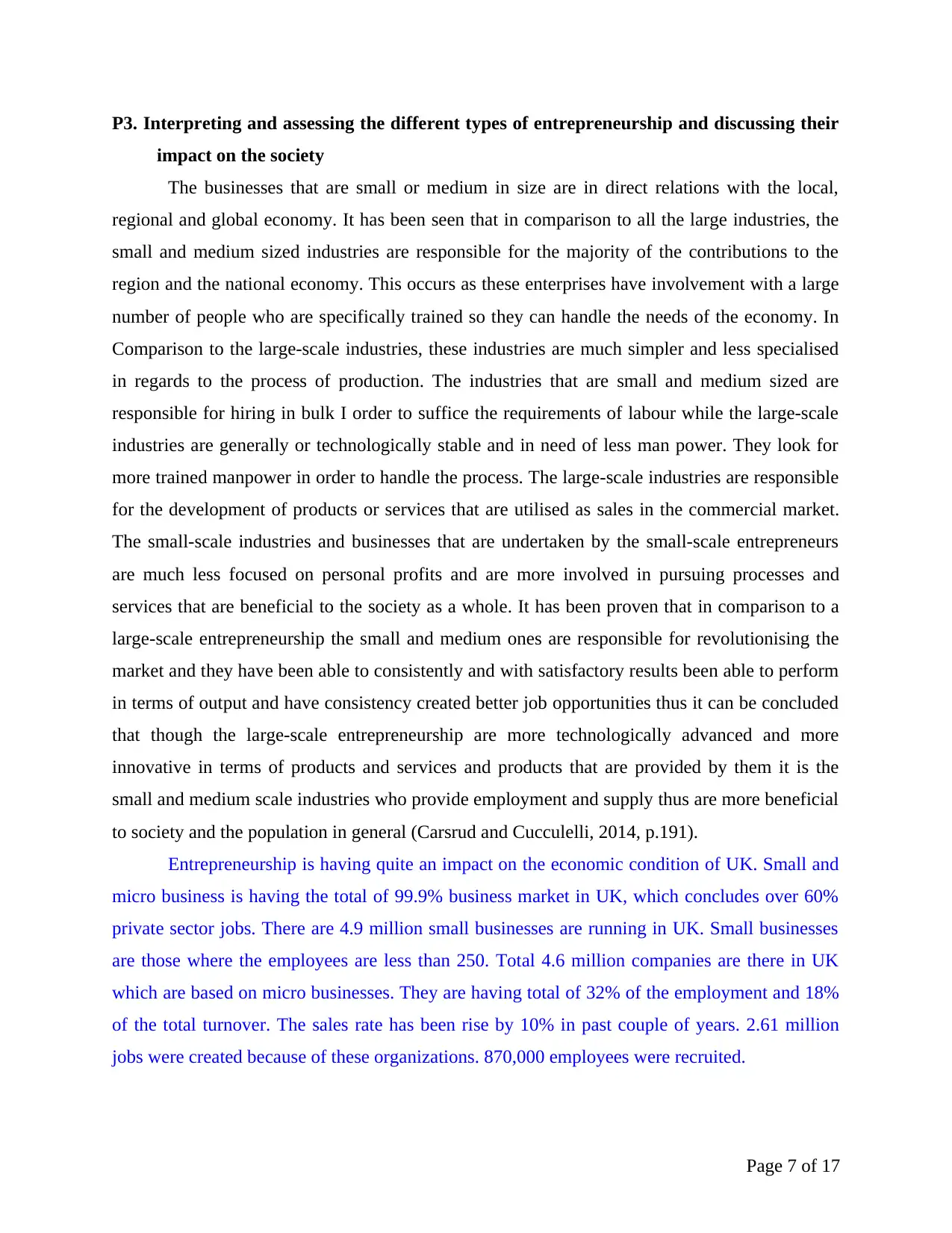
P3. Interpreting and assessing the different types of entrepreneurship and discussing their
impact on the society
The businesses that are small or medium in size are in direct relations with the local,
regional and global economy. It has been seen that in comparison to all the large industries, the
small and medium sized industries are responsible for the majority of the contributions to the
region and the national economy. This occurs as these enterprises have involvement with a large
number of people who are specifically trained so they can handle the needs of the economy. In
Comparison to the large-scale industries, these industries are much simpler and less specialised
in regards to the process of production. The industries that are small and medium sized are
responsible for hiring in bulk I order to suffice the requirements of labour while the large-scale
industries are generally or technologically stable and in need of less man power. They look for
more trained manpower in order to handle the process. The large-scale industries are responsible
for the development of products or services that are utilised as sales in the commercial market.
The small-scale industries and businesses that are undertaken by the small-scale entrepreneurs
are much less focused on personal profits and are more involved in pursuing processes and
services that are beneficial to the society as a whole. It has been proven that in comparison to a
large-scale entrepreneurship the small and medium ones are responsible for revolutionising the
market and they have been able to consistently and with satisfactory results been able to perform
in terms of output and have consistency created better job opportunities thus it can be concluded
that though the large-scale entrepreneurship are more technologically advanced and more
innovative in terms of products and services and products that are provided by them it is the
small and medium scale industries who provide employment and supply thus are more beneficial
to society and the population in general (Carsrud and Cucculelli, 2014, p.191).
Entrepreneurship is having quite an impact on the economic condition of UK. Small and
micro business is having the total of 99.9% business market in UK, which concludes over 60%
private sector jobs. There are 4.9 million small businesses are running in UK. Small businesses
are those where the employees are less than 250. Total 4.6 million companies are there in UK
which are based on micro businesses. They are having total of 32% of the employment and 18%
of the total turnover. The sales rate has been rise by 10% in past couple of years. 2.61 million
jobs were created because of these organizations. 870,000 employees were recruited.
Page 7 of 17
impact on the society
The businesses that are small or medium in size are in direct relations with the local,
regional and global economy. It has been seen that in comparison to all the large industries, the
small and medium sized industries are responsible for the majority of the contributions to the
region and the national economy. This occurs as these enterprises have involvement with a large
number of people who are specifically trained so they can handle the needs of the economy. In
Comparison to the large-scale industries, these industries are much simpler and less specialised
in regards to the process of production. The industries that are small and medium sized are
responsible for hiring in bulk I order to suffice the requirements of labour while the large-scale
industries are generally or technologically stable and in need of less man power. They look for
more trained manpower in order to handle the process. The large-scale industries are responsible
for the development of products or services that are utilised as sales in the commercial market.
The small-scale industries and businesses that are undertaken by the small-scale entrepreneurs
are much less focused on personal profits and are more involved in pursuing processes and
services that are beneficial to the society as a whole. It has been proven that in comparison to a
large-scale entrepreneurship the small and medium ones are responsible for revolutionising the
market and they have been able to consistently and with satisfactory results been able to perform
in terms of output and have consistency created better job opportunities thus it can be concluded
that though the large-scale entrepreneurship are more technologically advanced and more
innovative in terms of products and services and products that are provided by them it is the
small and medium scale industries who provide employment and supply thus are more beneficial
to society and the population in general (Carsrud and Cucculelli, 2014, p.191).
Entrepreneurship is having quite an impact on the economic condition of UK. Small and
micro business is having the total of 99.9% business market in UK, which concludes over 60%
private sector jobs. There are 4.9 million small businesses are running in UK. Small businesses
are those where the employees are less than 250. Total 4.6 million companies are there in UK
which are based on micro businesses. They are having total of 32% of the employment and 18%
of the total turnover. The sales rate has been rise by 10% in past couple of years. 2.61 million
jobs were created because of these organizations. 870,000 employees were recruited.
Page 7 of 17
Paraphrase This Document
Need a fresh take? Get an instant paraphrase of this document with our AI Paraphraser
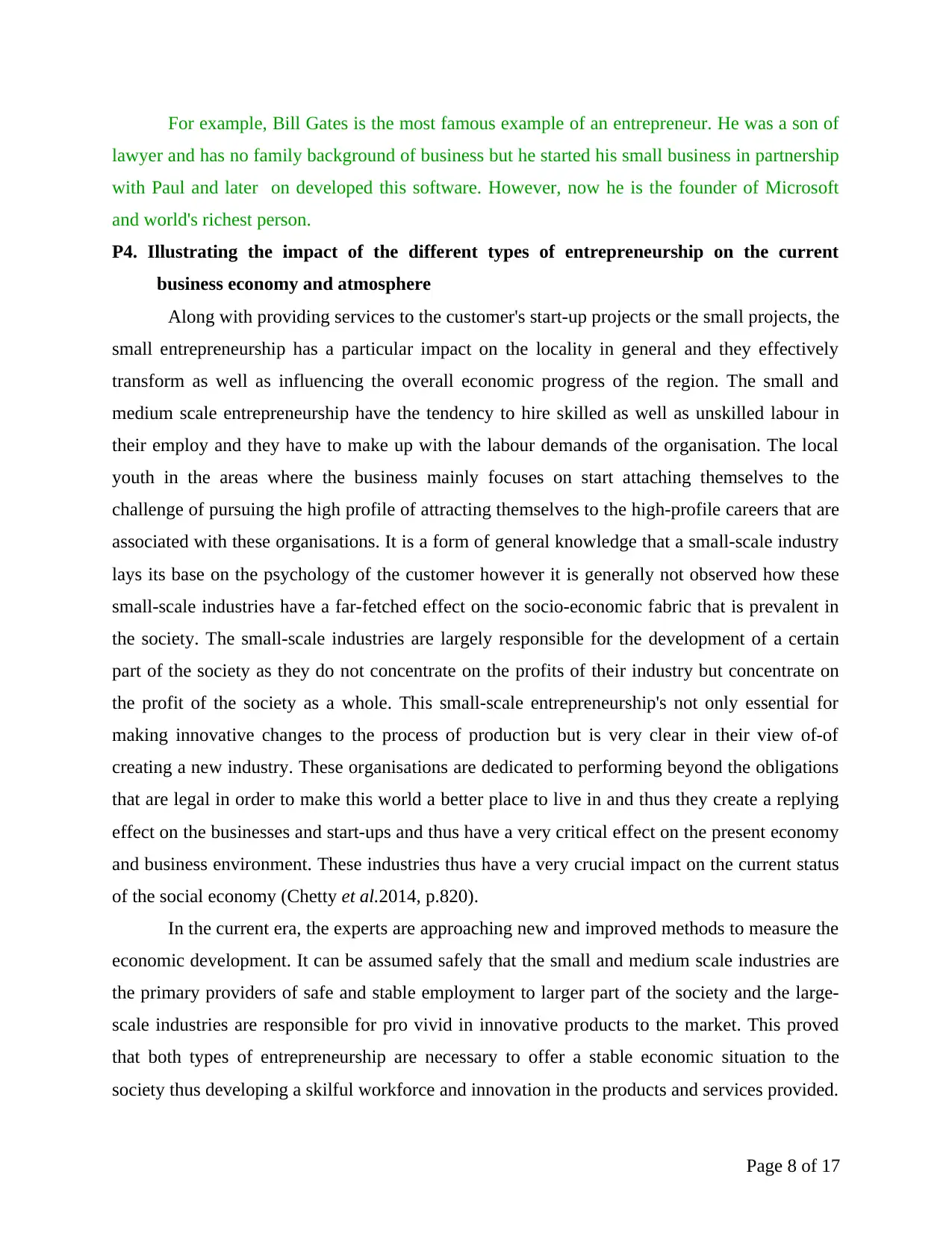
For example, Bill Gates is the most famous example of an entrepreneur. He was a son of
lawyer and has no family background of business but he started his small business in partnership
with Paul and later on developed this software. However, now he is the founder of Microsoft
and world's richest person.
P4. Illustrating the impact of the different types of entrepreneurship on the current
business economy and atmosphere
Along with providing services to the customer's start-up projects or the small projects, the
small entrepreneurship has a particular impact on the locality in general and they effectively
transform as well as influencing the overall economic progress of the region. The small and
medium scale entrepreneurship have the tendency to hire skilled as well as unskilled labour in
their employ and they have to make up with the labour demands of the organisation. The local
youth in the areas where the business mainly focuses on start attaching themselves to the
challenge of pursuing the high profile of attracting themselves to the high-profile careers that are
associated with these organisations. It is a form of general knowledge that a small-scale industry
lays its base on the psychology of the customer however it is generally not observed how these
small-scale industries have a far-fetched effect on the socio-economic fabric that is prevalent in
the society. The small-scale industries are largely responsible for the development of a certain
part of the society as they do not concentrate on the profits of their industry but concentrate on
the profit of the society as a whole. This small-scale entrepreneurship's not only essential for
making innovative changes to the process of production but is very clear in their view of-of
creating a new industry. These organisations are dedicated to performing beyond the obligations
that are legal in order to make this world a better place to live in and thus they create a replying
effect on the businesses and start-ups and thus have a very critical effect on the present economy
and business environment. These industries thus have a very crucial impact on the current status
of the social economy (Chetty et al.2014, p.820).
In the current era, the experts are approaching new and improved methods to measure the
economic development. It can be assumed safely that the small and medium scale industries are
the primary providers of safe and stable employment to larger part of the society and the large-
scale industries are responsible for pro vivid in innovative products to the market. This proved
that both types of entrepreneurship are necessary to offer a stable economic situation to the
society thus developing a skilful workforce and innovation in the products and services provided.
Page 8 of 17
lawyer and has no family background of business but he started his small business in partnership
with Paul and later on developed this software. However, now he is the founder of Microsoft
and world's richest person.
P4. Illustrating the impact of the different types of entrepreneurship on the current
business economy and atmosphere
Along with providing services to the customer's start-up projects or the small projects, the
small entrepreneurship has a particular impact on the locality in general and they effectively
transform as well as influencing the overall economic progress of the region. The small and
medium scale entrepreneurship have the tendency to hire skilled as well as unskilled labour in
their employ and they have to make up with the labour demands of the organisation. The local
youth in the areas where the business mainly focuses on start attaching themselves to the
challenge of pursuing the high profile of attracting themselves to the high-profile careers that are
associated with these organisations. It is a form of general knowledge that a small-scale industry
lays its base on the psychology of the customer however it is generally not observed how these
small-scale industries have a far-fetched effect on the socio-economic fabric that is prevalent in
the society. The small-scale industries are largely responsible for the development of a certain
part of the society as they do not concentrate on the profits of their industry but concentrate on
the profit of the society as a whole. This small-scale entrepreneurship's not only essential for
making innovative changes to the process of production but is very clear in their view of-of
creating a new industry. These organisations are dedicated to performing beyond the obligations
that are legal in order to make this world a better place to live in and thus they create a replying
effect on the businesses and start-ups and thus have a very critical effect on the present economy
and business environment. These industries thus have a very crucial impact on the current status
of the social economy (Chetty et al.2014, p.820).
In the current era, the experts are approaching new and improved methods to measure the
economic development. It can be assumed safely that the small and medium scale industries are
the primary providers of safe and stable employment to larger part of the society and the large-
scale industries are responsible for pro vivid in innovative products to the market. This proved
that both types of entrepreneurship are necessary to offer a stable economic situation to the
society thus developing a skilful workforce and innovation in the products and services provided.
Page 8 of 17
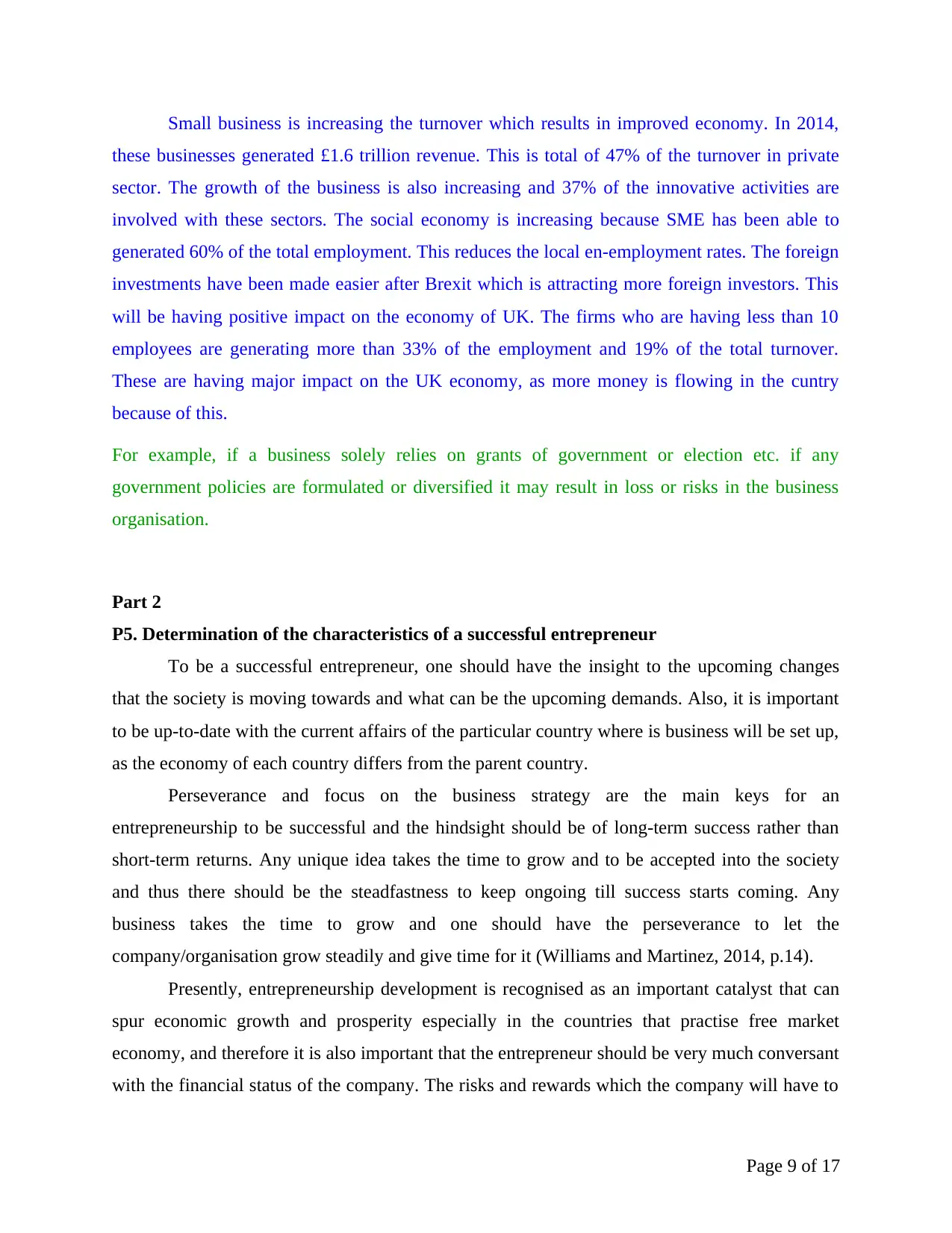
Small business is increasing the turnover which results in improved economy. In 2014,
these businesses generated £1.6 trillion revenue. This is total of 47% of the turnover in private
sector. The growth of the business is also increasing and 37% of the innovative activities are
involved with these sectors. The social economy is increasing because SME has been able to
generated 60% of the total employment. This reduces the local en-employment rates. The foreign
investments have been made easier after Brexit which is attracting more foreign investors. This
will be having positive impact on the economy of UK. The firms who are having less than 10
employees are generating more than 33% of the employment and 19% of the total turnover.
These are having major impact on the UK economy, as more money is flowing in the cuntry
because of this.
For example, if a business solely relies on grants of government or election etc. if any
government policies are formulated or diversified it may result in loss or risks in the business
organisation.
Part 2
P5. Determination of the characteristics of a successful entrepreneur
To be a successful entrepreneur, one should have the insight to the upcoming changes
that the society is moving towards and what can be the upcoming demands. Also, it is important
to be up-to-date with the current affairs of the particular country where is business will be set up,
as the economy of each country differs from the parent country.
Perseverance and focus on the business strategy are the main keys for an
entrepreneurship to be successful and the hindsight should be of long-term success rather than
short-term returns. Any unique idea takes the time to grow and to be accepted into the society
and thus there should be the steadfastness to keep ongoing till success starts coming. Any
business takes the time to grow and one should have the perseverance to let the
company/organisation grow steadily and give time for it (Williams and Martinez, 2014, p.14).
Presently, entrepreneurship development is recognised as an important catalyst that can
spur economic growth and prosperity especially in the countries that practise free market
economy, and therefore it is also important that the entrepreneur should be very much conversant
with the financial status of the company. The risks and rewards which the company will have to
Page 9 of 17
these businesses generated £1.6 trillion revenue. This is total of 47% of the turnover in private
sector. The growth of the business is also increasing and 37% of the innovative activities are
involved with these sectors. The social economy is increasing because SME has been able to
generated 60% of the total employment. This reduces the local en-employment rates. The foreign
investments have been made easier after Brexit which is attracting more foreign investors. This
will be having positive impact on the economy of UK. The firms who are having less than 10
employees are generating more than 33% of the employment and 19% of the total turnover.
These are having major impact on the UK economy, as more money is flowing in the cuntry
because of this.
For example, if a business solely relies on grants of government or election etc. if any
government policies are formulated or diversified it may result in loss or risks in the business
organisation.
Part 2
P5. Determination of the characteristics of a successful entrepreneur
To be a successful entrepreneur, one should have the insight to the upcoming changes
that the society is moving towards and what can be the upcoming demands. Also, it is important
to be up-to-date with the current affairs of the particular country where is business will be set up,
as the economy of each country differs from the parent country.
Perseverance and focus on the business strategy are the main keys for an
entrepreneurship to be successful and the hindsight should be of long-term success rather than
short-term returns. Any unique idea takes the time to grow and to be accepted into the society
and thus there should be the steadfastness to keep ongoing till success starts coming. Any
business takes the time to grow and one should have the perseverance to let the
company/organisation grow steadily and give time for it (Williams and Martinez, 2014, p.14).
Presently, entrepreneurship development is recognised as an important catalyst that can
spur economic growth and prosperity especially in the countries that practise free market
economy, and therefore it is also important that the entrepreneur should be very much conversant
with the financial status of the company. The risks and rewards which the company will have to
Page 9 of 17
⊘ This is a preview!⊘
Do you want full access?
Subscribe today to unlock all pages.

Trusted by 1+ million students worldwide
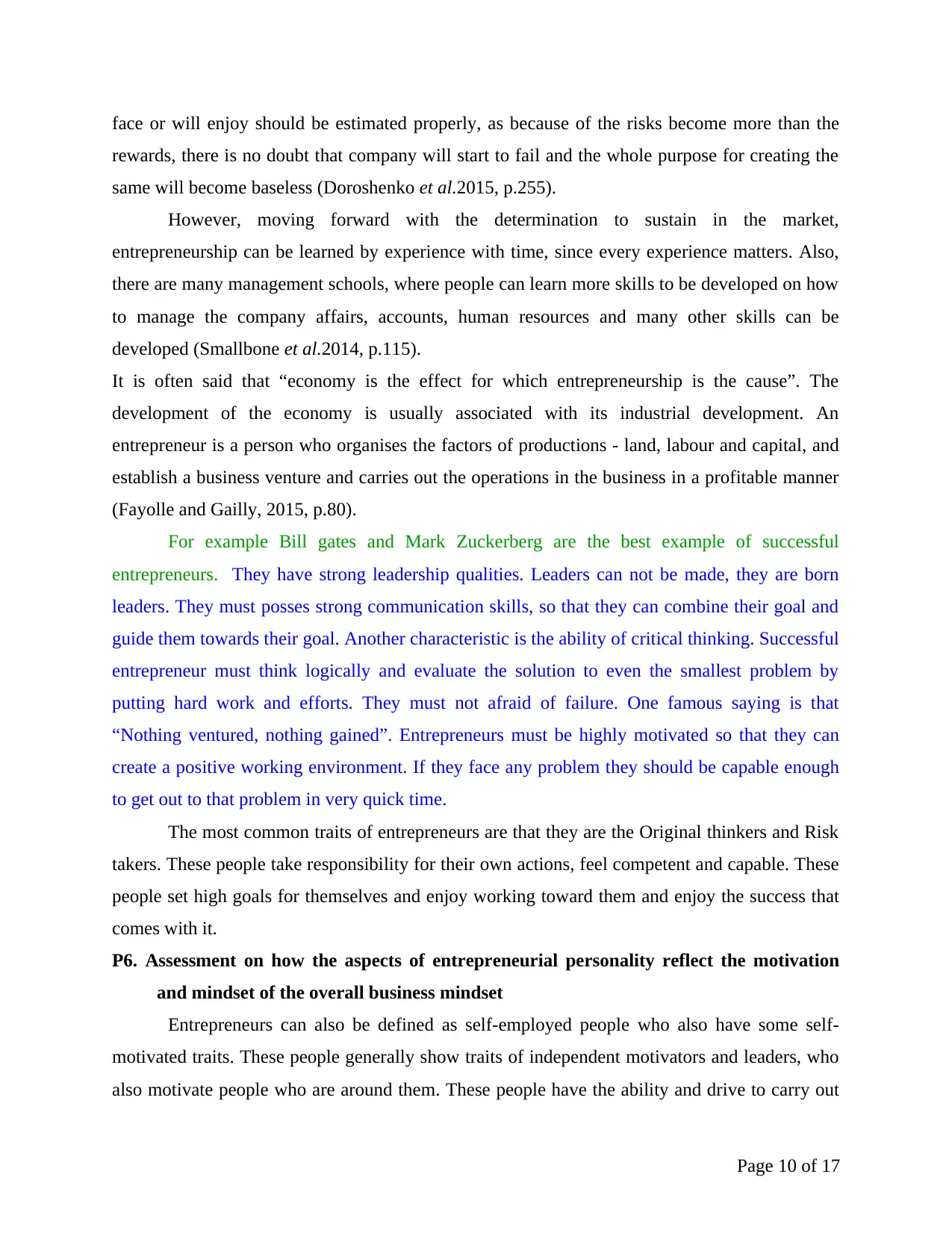
face or will enjoy should be estimated properly, as because of the risks become more than the
rewards, there is no doubt that company will start to fail and the whole purpose for creating the
same will become baseless (Doroshenko et al.2015, p.255).
However, moving forward with the determination to sustain in the market,
entrepreneurship can be learned by experience with time, since every experience matters. Also,
there are many management schools, where people can learn more skills to be developed on how
to manage the company affairs, accounts, human resources and many other skills can be
developed (Smallbone et al.2014, p.115).
It is often said that “economy is the effect for which entrepreneurship is the cause”. The
development of the economy is usually associated with its industrial development. An
entrepreneur is a person who organises the factors of productions - land, labour and capital, and
establish a business venture and carries out the operations in the business in a profitable manner
(Fayolle and Gailly, 2015, p.80).
For example Bill gates and Mark Zuckerberg are the best example of successful
entrepreneurs. They have strong leadership qualities. Leaders can not be made, they are born
leaders. They must posses strong communication skills, so that they can combine their goal and
guide them towards their goal. Another characteristic is the ability of critical thinking. Successful
entrepreneur must think logically and evaluate the solution to even the smallest problem by
putting hard work and efforts. They must not afraid of failure. One famous saying is that
“Nothing ventured, nothing gained”. Entrepreneurs must be highly motivated so that they can
create a positive working environment. If they face any problem they should be capable enough
to get out to that problem in very quick time.
The most common traits of entrepreneurs are that they are the Original thinkers and Risk
takers. These people take responsibility for their own actions, feel competent and capable. These
people set high goals for themselves and enjoy working toward them and enjoy the success that
comes with it.
P6. Assessment on how the aspects of entrepreneurial personality reflect the motivation
and mindset of the overall business mindset
Entrepreneurs can also be defined as self-employed people who also have some self-
motivated traits. These people generally show traits of independent motivators and leaders, who
also motivate people who are around them. These people have the ability and drive to carry out
Page 10 of 17
rewards, there is no doubt that company will start to fail and the whole purpose for creating the
same will become baseless (Doroshenko et al.2015, p.255).
However, moving forward with the determination to sustain in the market,
entrepreneurship can be learned by experience with time, since every experience matters. Also,
there are many management schools, where people can learn more skills to be developed on how
to manage the company affairs, accounts, human resources and many other skills can be
developed (Smallbone et al.2014, p.115).
It is often said that “economy is the effect for which entrepreneurship is the cause”. The
development of the economy is usually associated with its industrial development. An
entrepreneur is a person who organises the factors of productions - land, labour and capital, and
establish a business venture and carries out the operations in the business in a profitable manner
(Fayolle and Gailly, 2015, p.80).
For example Bill gates and Mark Zuckerberg are the best example of successful
entrepreneurs. They have strong leadership qualities. Leaders can not be made, they are born
leaders. They must posses strong communication skills, so that they can combine their goal and
guide them towards their goal. Another characteristic is the ability of critical thinking. Successful
entrepreneur must think logically and evaluate the solution to even the smallest problem by
putting hard work and efforts. They must not afraid of failure. One famous saying is that
“Nothing ventured, nothing gained”. Entrepreneurs must be highly motivated so that they can
create a positive working environment. If they face any problem they should be capable enough
to get out to that problem in very quick time.
The most common traits of entrepreneurs are that they are the Original thinkers and Risk
takers. These people take responsibility for their own actions, feel competent and capable. These
people set high goals for themselves and enjoy working toward them and enjoy the success that
comes with it.
P6. Assessment on how the aspects of entrepreneurial personality reflect the motivation
and mindset of the overall business mindset
Entrepreneurs can also be defined as self-employed people who also have some self-
motivated traits. These people generally show traits of independent motivators and leaders, who
also motivate people who are around them. These people have the ability and drive to carry out
Page 10 of 17
Paraphrase This Document
Need a fresh take? Get an instant paraphrase of this document with our AI Paraphraser
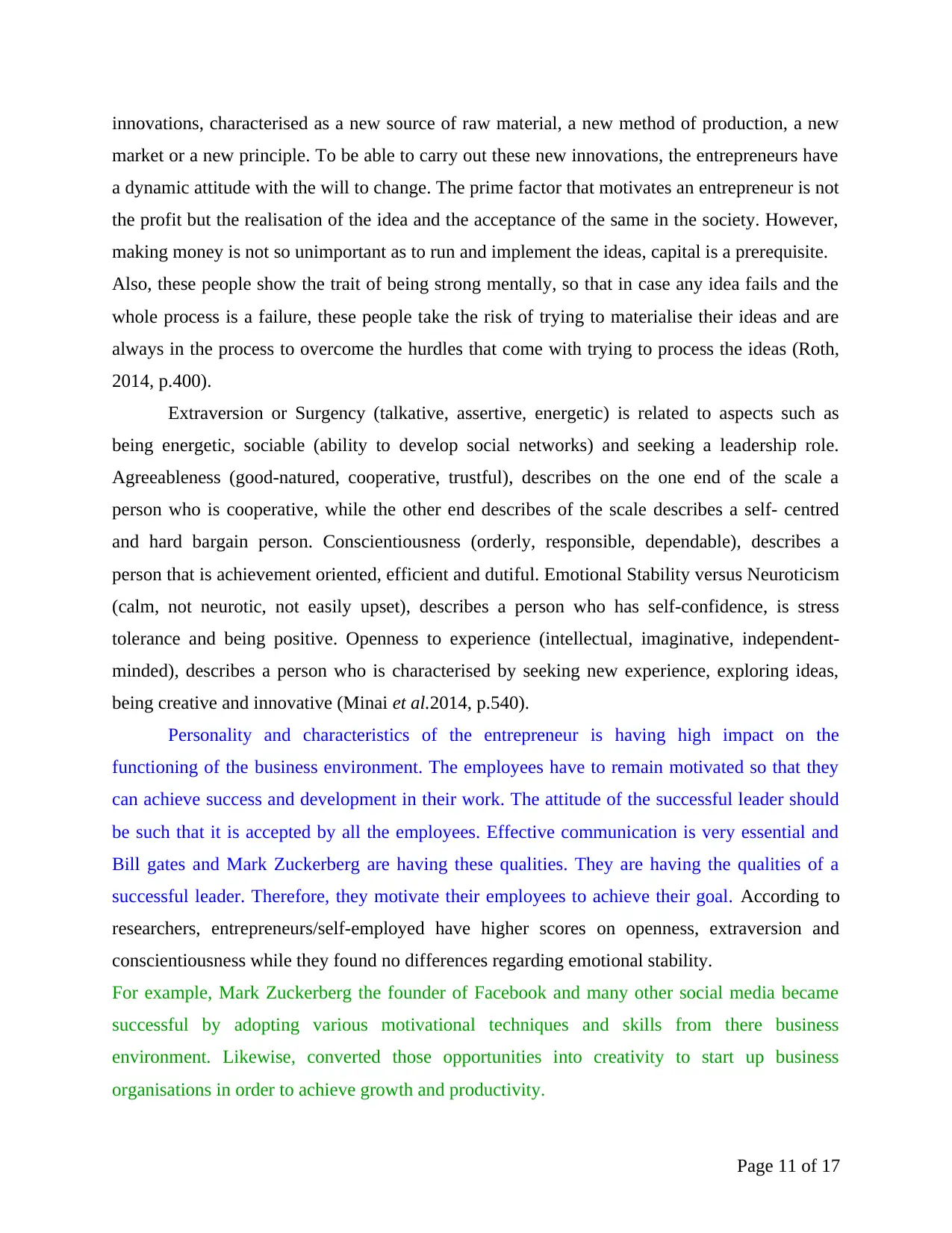
innovations, characterised as a new source of raw material, a new method of production, a new
market or a new principle. To be able to carry out these new innovations, the entrepreneurs have
a dynamic attitude with the will to change. The prime factor that motivates an entrepreneur is not
the profit but the realisation of the idea and the acceptance of the same in the society. However,
making money is not so unimportant as to run and implement the ideas, capital is a prerequisite.
Also, these people show the trait of being strong mentally, so that in case any idea fails and the
whole process is a failure, these people take the risk of trying to materialise their ideas and are
always in the process to overcome the hurdles that come with trying to process the ideas (Roth,
2014, p.400).
Extraversion or Surgency (talkative, assertive, energetic) is related to aspects such as
being energetic, sociable (ability to develop social networks) and seeking a leadership role.
Agreeableness (good‐natured, cooperative, trustful), describes on the one end of the scale a
person who is cooperative, while the other end describes of the scale describes a self‐ centred
and hard bargain person. Conscientiousness (orderly, responsible, dependable), describes a
person that is achievement oriented, efficient and dutiful. Emotional Stability versus Neuroticism
(calm, not neurotic, not easily upset), describes a person who has self‐confidence, is stress
tolerance and being positive. Openness to experience (intellectual, imaginative, independent‐
minded), describes a person who is characterised by seeking new experience, exploring ideas,
being creative and innovative (Minai et al.2014, p.540).
Personality and characteristics of the entrepreneur is having high impact on the
functioning of the business environment. The employees have to remain motivated so that they
can achieve success and development in their work. The attitude of the successful leader should
be such that it is accepted by all the employees. Effective communication is very essential and
Bill gates and Mark Zuckerberg are having these qualities. They are having the qualities of a
successful leader. Therefore, they motivate their employees to achieve their goal. According to
researchers, entrepreneurs/self‐employed have higher scores on openness, extraversion and
conscientiousness while they found no differences regarding emotional stability.
For example, Mark Zuckerberg the founder of Facebook and many other social media became
successful by adopting various motivational techniques and skills from there business
environment. Likewise, converted those opportunities into creativity to start up business
organisations in order to achieve growth and productivity.
Page 11 of 17
market or a new principle. To be able to carry out these new innovations, the entrepreneurs have
a dynamic attitude with the will to change. The prime factor that motivates an entrepreneur is not
the profit but the realisation of the idea and the acceptance of the same in the society. However,
making money is not so unimportant as to run and implement the ideas, capital is a prerequisite.
Also, these people show the trait of being strong mentally, so that in case any idea fails and the
whole process is a failure, these people take the risk of trying to materialise their ideas and are
always in the process to overcome the hurdles that come with trying to process the ideas (Roth,
2014, p.400).
Extraversion or Surgency (talkative, assertive, energetic) is related to aspects such as
being energetic, sociable (ability to develop social networks) and seeking a leadership role.
Agreeableness (good‐natured, cooperative, trustful), describes on the one end of the scale a
person who is cooperative, while the other end describes of the scale describes a self‐ centred
and hard bargain person. Conscientiousness (orderly, responsible, dependable), describes a
person that is achievement oriented, efficient and dutiful. Emotional Stability versus Neuroticism
(calm, not neurotic, not easily upset), describes a person who has self‐confidence, is stress
tolerance and being positive. Openness to experience (intellectual, imaginative, independent‐
minded), describes a person who is characterised by seeking new experience, exploring ideas,
being creative and innovative (Minai et al.2014, p.540).
Personality and characteristics of the entrepreneur is having high impact on the
functioning of the business environment. The employees have to remain motivated so that they
can achieve success and development in their work. The attitude of the successful leader should
be such that it is accepted by all the employees. Effective communication is very essential and
Bill gates and Mark Zuckerberg are having these qualities. They are having the qualities of a
successful leader. Therefore, they motivate their employees to achieve their goal. According to
researchers, entrepreneurs/self‐employed have higher scores on openness, extraversion and
conscientiousness while they found no differences regarding emotional stability.
For example, Mark Zuckerberg the founder of Facebook and many other social media became
successful by adopting various motivational techniques and skills from there business
environment. Likewise, converted those opportunities into creativity to start up business
organisations in order to achieve growth and productivity.
Page 11 of 17
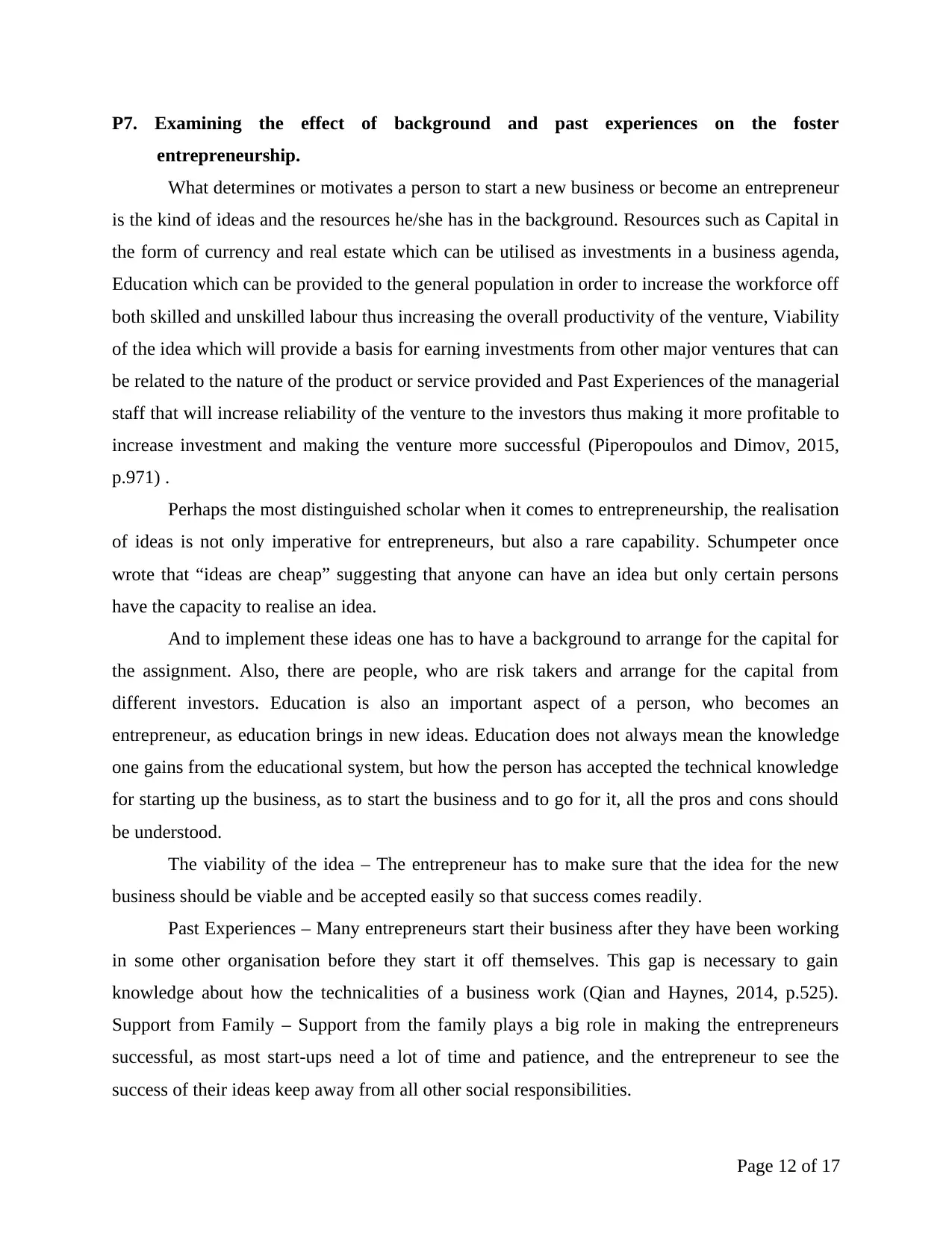
P7. Examining the effect of background and past experiences on the foster
entrepreneurship.
What determines or motivates a person to start a new business or become an entrepreneur
is the kind of ideas and the resources he/she has in the background. Resources such as Capital in
the form of currency and real estate which can be utilised as investments in a business agenda,
Education which can be provided to the general population in order to increase the workforce off
both skilled and unskilled labour thus increasing the overall productivity of the venture, Viability
of the idea which will provide a basis for earning investments from other major ventures that can
be related to the nature of the product or service provided and Past Experiences of the managerial
staff that will increase reliability of the venture to the investors thus making it more profitable to
increase investment and making the venture more successful (Piperopoulos and Dimov, 2015,
p.971) .
Perhaps the most distinguished scholar when it comes to entrepreneurship, the realisation
of ideas is not only imperative for entrepreneurs, but also a rare capability. Schumpeter once
wrote that “ideas are cheap” suggesting that anyone can have an idea but only certain persons
have the capacity to realise an idea.
And to implement these ideas one has to have a background to arrange for the capital for
the assignment. Also, there are people, who are risk takers and arrange for the capital from
different investors. Education is also an important aspect of a person, who becomes an
entrepreneur, as education brings in new ideas. Education does not always mean the knowledge
one gains from the educational system, but how the person has accepted the technical knowledge
for starting up the business, as to start the business and to go for it, all the pros and cons should
be understood.
The viability of the idea – The entrepreneur has to make sure that the idea for the new
business should be viable and be accepted easily so that success comes readily.
Past Experiences – Many entrepreneurs start their business after they have been working
in some other organisation before they start it off themselves. This gap is necessary to gain
knowledge about how the technicalities of a business work (Qian and Haynes, 2014, p.525).
Support from Family – Support from the family plays a big role in making the entrepreneurs
successful, as most start-ups need a lot of time and patience, and the entrepreneur to see the
success of their ideas keep away from all other social responsibilities.
Page 12 of 17
entrepreneurship.
What determines or motivates a person to start a new business or become an entrepreneur
is the kind of ideas and the resources he/she has in the background. Resources such as Capital in
the form of currency and real estate which can be utilised as investments in a business agenda,
Education which can be provided to the general population in order to increase the workforce off
both skilled and unskilled labour thus increasing the overall productivity of the venture, Viability
of the idea which will provide a basis for earning investments from other major ventures that can
be related to the nature of the product or service provided and Past Experiences of the managerial
staff that will increase reliability of the venture to the investors thus making it more profitable to
increase investment and making the venture more successful (Piperopoulos and Dimov, 2015,
p.971) .
Perhaps the most distinguished scholar when it comes to entrepreneurship, the realisation
of ideas is not only imperative for entrepreneurs, but also a rare capability. Schumpeter once
wrote that “ideas are cheap” suggesting that anyone can have an idea but only certain persons
have the capacity to realise an idea.
And to implement these ideas one has to have a background to arrange for the capital for
the assignment. Also, there are people, who are risk takers and arrange for the capital from
different investors. Education is also an important aspect of a person, who becomes an
entrepreneur, as education brings in new ideas. Education does not always mean the knowledge
one gains from the educational system, but how the person has accepted the technical knowledge
for starting up the business, as to start the business and to go for it, all the pros and cons should
be understood.
The viability of the idea – The entrepreneur has to make sure that the idea for the new
business should be viable and be accepted easily so that success comes readily.
Past Experiences – Many entrepreneurs start their business after they have been working
in some other organisation before they start it off themselves. This gap is necessary to gain
knowledge about how the technicalities of a business work (Qian and Haynes, 2014, p.525).
Support from Family – Support from the family plays a big role in making the entrepreneurs
successful, as most start-ups need a lot of time and patience, and the entrepreneur to see the
success of their ideas keep away from all other social responsibilities.
Page 12 of 17
⊘ This is a preview!⊘
Do you want full access?
Subscribe today to unlock all pages.

Trusted by 1+ million students worldwide
1 out of 17
Related Documents
Your All-in-One AI-Powered Toolkit for Academic Success.
+13062052269
info@desklib.com
Available 24*7 on WhatsApp / Email
![[object Object]](/_next/static/media/star-bottom.7253800d.svg)
Unlock your academic potential
Copyright © 2020–2025 A2Z Services. All Rights Reserved. Developed and managed by ZUCOL.




